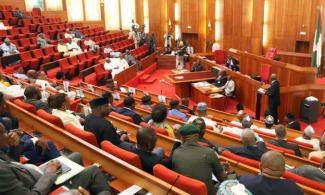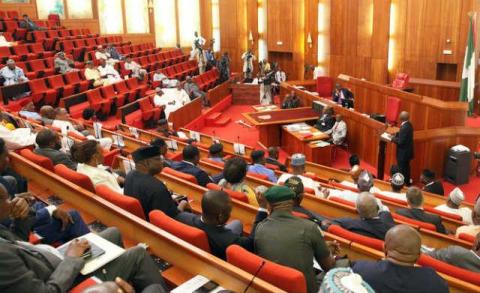
Buhari and Malami had in the suit marked SC/CV/504/2022 and filed on April 29, 2022, removed the clause in the electoral act.
The National Assembly has asked the Supreme Court of Nigeria to strike out the suit instituted by President Muhammadu Buhari and the Attorney-General of the Federation, Abubakar Malami (SAN) over Section 84 (12) of the Electoral (Amendment) Act, 2022.
Buhari and Malami had in the suit marked SC/CV/504/2022 and filed on April 29, 2022, removed the clause in the electoral act.

The duo told the apex court that the Section 84 (12) of the Electoral (Amendment) Act, 2022 is inconsistent with the provisions of sections 42, 65, 66, 106, 107, 131, 137, 147, 151, 177, 182, 192 and 196 of the Constitution of Federal Republic of Nigeria, 1999, (as amended), as well Article 2 of the African Charter on Human and People and Peoples Rights.
They are seeking an order of the court to strike out the section of the Act, which they said was inconsistent with the nation’s constitution.
President Buhari had on February 25, 2022, signed the electoral bill into law with a caveat that the section should be deleted in order to deepen democracy in the country.
But the National Assembly in March threw out the President’s request and insisted that serving political appointees must resign before contesting elections.
Malami, who also opposed the lawmakers’ decision, vowed that the Nigerian government would explore other means, including the court to ensure the provision that he claimed offended other sections of the constitution, was expunged from the amended Act.
However, the National Assembly in its counter-affidavit filed by its lawyer, Kayode Ajulo said the Supreme Court cannot be invoked to amend the provision of any law validity made by lawmakers in the exercise of their legislative powers as granted by the Nigerian constitution.
They argued that the 1999 Constitution as amended gave the National Assembly the power to make laws for good governance in Nigeria.
The court document obtained by SaharaReporters read, “We submit that the 1st Plaintiff having on Friday, 25th February, 2022 signed the Electoral Bill, 2022 into law in accordance with the Constitution, cannot approbate at the same time by making a U-turn by using the machinery of this Honorable Court as enshrined in Section 232 of the Constitution of the Federal Republic of Nigeria 1999 (as amended) and the Supreme Court (Additional Jurisdiction) Act of 2002 to partly undo that which by the provision of Section 58 of the Constitution of the Federal Republic of Nigeria 1999 (As Amended) has been done.
“By assenting to the passage of the Electoral Bill, 2022 into law, the 1st Plaintiff has conclusively discharged his duty under the Constitution and there is no basis to attempting to undo that which he has done by virtue of his powers under Section 58 of the Constitution of the Federal Republic of Nigeria 1999 (as amended).
“We submit that the act complained of is a joint and voluntary act of the 1st Plaintiff and the Defendant in the exercise of his powers to assent to a bill for Act of the National Assembly as provided by the provisions of Section 58(4) and (5) of Constitution of the Federal Republic of Nigeria 1999 (as amended).
“My Lords, we must commend the audacious attempt by the Plaintiffs to build a castle in the air. However, we must be guided by our knowledge of the law of physics and dynamics of our mortal would in calling the Plaintiffs to order so as to prevent the impending waste of state resources by embarking on what should be ordinarily be found within the infantile imagination of a six-year-old who is still exploring the infant probabilities of overindulgence in Marvel comics.
“The original jurisdiction of the Supreme Court cannot be invoked to amend the provision of any law validity made by the National Assembly in the exercise of the legislative powers granted it by the Constitution of the Federal Republic of Nigeria 1999 (as amended).
“The suit as constituted neither discloses nor raises any question of law or fact which may give rise to the existence or extent of a legal right in favour of the office of the 1st Plaintiff/Respondent.
“The original jurisdiction of the Supreme Court as contained in Section 232(1) of the Constitution of the FRN 1999 (as amended) and section 1(1)(A) of the Supreme Court (Additional jurisdiction) Act. No. 3 2002 cannot be invoked to institute an action for the enforcement of human rights as enshrined in the African Charter on Human and People and Peoples Rights.”